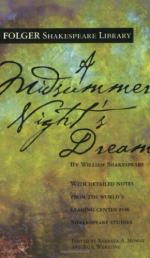|
This section contains 7,467 words (approx. 25 pages at 300 words per page) |

|
SOURCE: Mikics, Davis. “Poetry and Politics in A Midsummer Night's Dream.” Raritan 18, no. 2 (fall 1998): 99-119.
In the following essay, Mikics examines the dichotomy between poetry and politics in A Midsummer Night's Dream and contends that Shakespeare makes a claim “for poetry in the face of power.”
James Nohrnberg begins his vast summa of Spenser and Renaissance poetics, The Analogy of the Faerie Queene, with a line from Pico: “He who cannot attract Pan, approaches Proteus in vain.” For a long time Renaissance studies wrestled Proteus, trying to whip the various energies of the era into encyclopedic shape. But new historicism, the alpha and omega of current Renaissance criticism, has largely abandoned the earlier critical interest in coherence and harmony. This is true, sadly, on a programmatic as well as a thematic level. Current work on Shakespeare rarely attempts an explanatory account of a given play in light of...
|
This section contains 7,467 words (approx. 25 pages at 300 words per page) |

|


